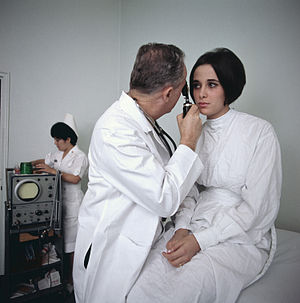 Image via Wikipedia
Image via WikipediaLast Friday I found an interesting article over at the Fibromyalgia Network website called Patient Rights & Second Medical Opinions. So I posted it on the Oh My Aches and Pains! Facebook page. Since the article talks about coping with a less than helpful doctor, I asked the question, "A doctor giving up on a patient? Well yes, this has happen to me. Has it happened to you too???"
When I got a heart-wrenching response, I knew I needed to ask this question here on my blog too.
Now I initially wanted to write about a doctor that gave up on me while I was struggling to get my mysterious chronic pain and fatigue worked up and diagnosed. But I decided I didn't want to go back and relive all the drama he caused in my life. Instead, I just wanted you to know that it has happened to me, more than once, and I coped by firing the doctor and searching for a better one.
I won't deny that finding a new doctor can be a pain in the butt. I also acknowledge that as the patient, I have taken the brunt of the negative fallout in these stressful doctor-patient interactions. I've come to accept that finding a new doctor is all too often a necessary step in getting good, quality health care when you live with chronic illnesses. I've also decided that I need to take advantage of grievance programs through medical institutions and medical licensing boards to deal with some of the unfair treatment I receive.
That said, what I really want to write about is how the true problem lies with the role assigned to and our expectations of doctors in our society. Consider that after our parents and teachers, theirs is some of the most respected and heeded advice we receive. We're taught to view them as the experts in all things medical and health care. After all, they take an oath to, among other things, apply all measures necessary to treat a patient, prevent disease and do no harm.
The bottom line: we put doctors on a pedestal. Which is fine, I guess, until something knocks them down...
Despite the plethora of ethics in the Hippocratic Oath, for all practical purposes there seems to be a loophole, because the beginning of the oath goes like this: "I swear to fulfill, to the best of my ability and judgment..." (For a real eye-opener, follow the link above and read the entire oath for yourself. The compare the ideals espoused by the oath to what really happens to you when you see your doctor.)
I've surmised that figuring out exactly what "the best of (their) ability and judgment" looks like is the job of every patient. Which means instead of blindly relying on their presumed medical expertise, we need to be keeping track and making notes each time we see our doctors. We need to decide if a doctor meets our needs and is practicing good judgment. Sure, we may not be medical experts ourselves, but that shouldn't stop us from saying no to medical care that is arrogant, disinterested, dismissive or unsympathetic.
Most of all, we need to learn how to not take it personally when our doctors' fail us. Clearly there is going to be some variation in what the "best ability and judgment" looks like across the entire medical profession. Not every doctor is going to be a good fit for what we need, both in medical practice and bedside manner. We need to be active in our medical care when it comes to exercising our choice of medical providers whenever we are allowed to do so.
So maybe what I am really asking you to share with me this week is: How did you overcome situations in which your doctor gave up on you? Leave a comment here or on the OMA&P! Facebook page with your thoughts, suggestions and encouraging stories.
































